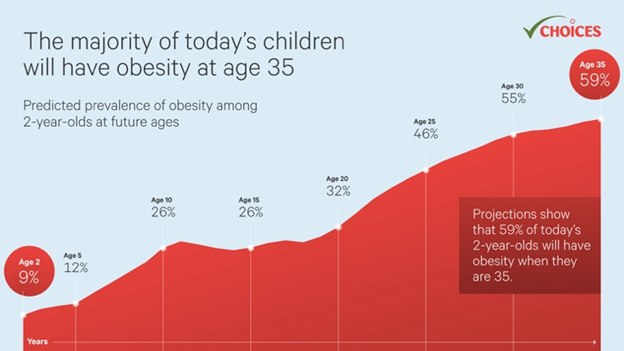Introduction
September is Childhood Obesity Month, a time dedicated to raising awareness to prevent and reduce childhood obesity. NACCHO focuses on improving nutrition security within the first 1,000 days of life, the period from pregnancy until a child’s second birthday, as it is a critical period for rapid development and an optimal window for establishing lifelong healthy dietary patterns to prevent chronic diseases, including obesity. Exclusive breastfeeding for the first six months of life and continued breastfeeding with appropriate nutrient-dense, age-appropriate complementary foods reduce the risk of childhood obesity and other chronic diseases for lactating parents and breastfed children. However, not all children have easy access to culturally responsive healthy foods during the first 1,000 days of life and beyond. Research shows that children experiencing excess weight incur an extra $120 in medical costs each year and adults with excess weight incur an additional $1,900 in medical expenses yearly.
Early Childhood Nutrition
Optimal nutrition is critical to maintaining optimal health, growth, and development across the lifespan, and healthy eating habits should begin very early in early childhood. Healthy eating patterns during the first two years of life lower the risk of severe health concerns such as impaired growth, type 2 diabetes, and obesity.
However, about one-third (32%) of infants in the U.S. are introduced to complementary foods before the age of six months. Due to historical and socioeconomic influences, the early introduction of complementary foods is more common within Black and Hispanic communities. Complementary foods rich in iron and zinc must ensure adequate nutrition and exposure to flavors, textures, and different foods. Read more about the 2020-2025 U.S. Dietary Guidelines’ evidence-based recommendations for infants and toddlers here.

Last year, NACCHO hosted three in-person regional convenings with 51 multisector professionals within the local health system to further investigate and identify best practices and solutions to improve the first 1,000 days of nutrition infrastructure in historically neglected communities. In addition, a virtual national stakeholders’ convening was hosted to understand how national organizations can support the community nutrition infrastructure. Click here to view the solutions and lessons learned from the Improving Infant and Young Child Nutrition convenings during the first 1,000 days in Communities of Color Final Report.
NACCHO has been part of My Plate National Strategic Partners. It has supported the CDC and USDA to promote and diversify Chapter 2 of the Dietary Guidelines for Americans, dedicated to Infants and Toddlers. NACCHO has co-created culturally diverse nutrition handouts for infants and toddlers based on the Dietary Guidelines with different communities. Click here to access the nutrition education toolkit, including recipes, for Chinese and Vietnamese communities. The Latinx African-American and Black Caribbeans resources are coming up this Fall 2023!
Food and Nutrition Insecurity and Obesity Paradox
In the United States, food insecurity is a risk factor for obesity, and both are consequences of economic and social disadvantages. This paradoxical link is due to food insecure populations being more likely to have easier access to high-energy, processed foods due to their affordability and challenges in access to healthy foods in historically marginalized communities, which increases the likelihood of experiencing obesity. The prevalence of childhood obesity within Latino/x (22%), Black (20.8%), and American Indian and Native (31.2%) children are much higher compared to White (15.9%) children. The prevalence of households with food-insecure children in the U.S. is higher among Latino/x (18%) and Black (22.7%) households, and they are also more likely to experience nutrition insecurity and obesity. Improved access to fresh produce, culturally responsive nutrition education, safe play and physical activity environments, and policies promoting more suitable conditions for healthy living are some strategies to prevent and reduce childhood obesity.
Family Healthy Weight Program
NACCHO has also worked to identify the local health department’s capacity to implement lifestyle management programs to prevent and reduce excess weight in children. A Family Healthy Weight Program is an evidence-based, family-based lifestyle-change program focusing on behavior-change strategies for healthy eating and physical activity. The program aims to help children with overweight and obesity make progress towards a healthier weight by offering evidence-based strategies, such as family-based nutrition counseling, parental goal-setting and role modeling sessions, group physical activity sessions, and more. Through this work, we listened to over 150 local health departments to understand the needs and experience of implementing these programs.
Partnership Highlight: Childhood Obesity Intervention Cost-Effectiveness Study (CHOICES) Project
The Childhood Obesity Intervention Cost-Effectiveness Study (CHOICES) Project identifies and prioritizes cost-effective strategies to increase healthy eating and physical activity to promote healthy weight. The CHOICES Project uses cost-effectiveness analysis to determine which prevention policies and programs will help more kids achieve and maintain a healthy weight and deliver the best results for the dollars invested. Engagement opportunities include the CHOICES Community of Practice, an online offering from the Harvard T.H. Chan School of Public Health in partnership with NACCHO, that hosts coffee chats and shares evidence-based resources related to cost-effective and equitable interventions to promote healthy eating and physical activity. The CHOICES Community of Practice includes people whose work focuses on advancing obesity prevention, healthy eating, and active living and who want to learn more about how cost-effectiveness analysis can increase their efforts. Register to join here.
Funding Opportunities
To improve optimal nutrition for infants and toddlers in your communities, apply to our two current funding opportunities:
Request for Applications (RFA): Bridging Breastfeeding Continuity of Care and Nutrition Security within the First 1,000 Days: Blueprint Cohort III
With support from the Centers for Disease Control and Prevention’s Division of Nutrition, Physical Activity, and Obesity (DNPAO), NACCHO is pleased to announce a funding opportunity to support the implementation of the Continuity of Care in Breastfeeding Support: A Blueprint for Communities to strengthen community lactation support. Applicants must apply with at least two key partners to implement strategies from at least three recommendations from the CoC Blueprint. Applicants can also select additional activities to improve the community’s child nutrition security infrastructure.
Applications must be submitted no later than October 1, 2023, at 11:59 PM PST. Selected grantees will be announced by October 13, 2023. All necessary information regarding the project and application process may be found here. For a direct link to an application, click here.
NACCHO will host a webinar for interested applicants on Thursday, September 21, at 1:00 p.m. ET to provide an overview of this funding opportunity. This webinar will be recorded, shared with webinar registrants, and posted on NACCHO’s website. Register for the webinar here.
Request for Proposals (RFP): Culturally Responsive Nutrition Materials for Infants and Toddlers
With support from the Centers for Disease Control and Prevention’s Division of Nutrition, Physical Activity, and Obesity (DNPAO), NACCHO is pleased to offer a funding opportunity for up to two (2) consultants to develop culturally responsive educational materials for Black, Indigenous and other People of Color (BIPOC) and/or Refugee, Immigrant, and Migrant (RIM) communities. Up to two (2) awards with funding of up to $13,000 for each are available.
Applications must be submitted by November 13, 2023, at 11:59 p.m. PST. Selected grantees will be announced by November 20, 2023. The project period will begin on the date of contract execution on July 31, 2024. All information for the RFP can be found here. Please email complete applications to [email protected].
To learn more about childhood obesity prevention, check out the CDC’s website here.
Engage with us!
To receive information about the CoC Blueprint funding opportunities, please subscribe to NACCHO’s monthly newsletter using your MyNACCHO account. You can sign up here if you do not have a “MyNACCHO” account.
To contribute resources and other materials to the CoC Resource Library, don’t hesitate to contact [email protected].



